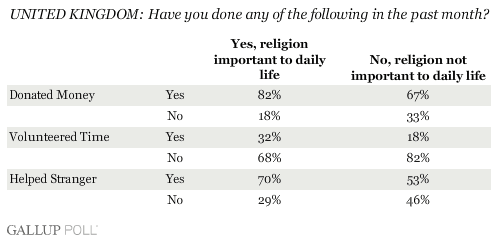More statistics:
http://www.catholiceducation.org/articles/apologetics/ap0264.htm
Atheists often claim to be "just as moral" as religious believers.
Christopher Hitchens, for instance, in God Is Not Great, offers his rather vague and subjective assertion that no statistic will ever find that atheists "commit more crimes of greed or violence than the faithful."
Yet, when comparing the morals of believers and nonbelievers, neo-atheist authors are careful to tiptoe around the issue of charitable activity. The reason that atheists studiously avoid the question of generosity is that study after study shows an overwhelming difference between believers and non-believers. Not surprisingly, the believers come out on top every time.
.......
Whether we speak about the evils and bloodshed of atheist regimes, the generosity and charitable giving of religious people, or simply the happiness derived from religious faith, religion beats atheism hands down in every area. This fact alone will give pause to any unbiased observer.
http://www.hoover.org/publications/policy-review/article/6577
.......
How do religious and secular people vary in their charitable behavior? To answer this, I turn to data collected expressly to explore patterns in American civic life. The Social Capital Community Benchmark Survey (sccbs) was undertaken in 2000 by researchers at universities throughout the United States and the Roper Center for Public Opinion Research. The data consist of nearly 30,000 observations drawn from 50 communities across the United States and ask individuals about their “civic behavior,” including their giving and volunteering during the year preceding the survey.
........
The differences in charity between secular and religious people are dramatic. Religious people are 25 percentage points more likely than secularists to donate money (91 percent to 66 percent) and 23 points more likely to volunteer time (67 percent to 44 percent). And, consistent with the findings of other writers, these data show that practicing a religion is more important than the actual religion itself in predicting charitable behavior. For example, among those who attend worship services regularly, 92 percent of Protestants give charitably, compared with 91 percent of Catholics, 91 percent of Jews, and 89 percent from other religions.
.........
http://www.gallup.com/poll/102961/charitable-giving-differs-canada-uk-us.aspx
http://www.usatoday.com/news/opinion/forum/2010-11-15-column15_ST_N.htm?loc=interstitialskip
........................
The differences between religious and secular Americans can be dramatic. Forty percent of worship-attending Americans volunteer regularly to help the poor and elderly, compared with 15% of Americans who never attend services. Frequent-attenders are also more likely than the never-attenders to volunteer for school and youth programs (36% vs. 15%), a neighborhood or civic group (26% vs. 13%), and for health care (21% vs. 13%). The same is true for philanthropic giving; religious Americans give more money to secular causes than do secular Americans. And the list goes on, as it is true for good deeds such as helping someone find a job, donating blood, and spending time with someone who is feeling blue.
.........

